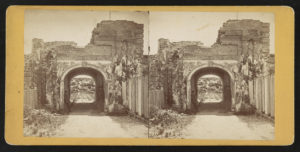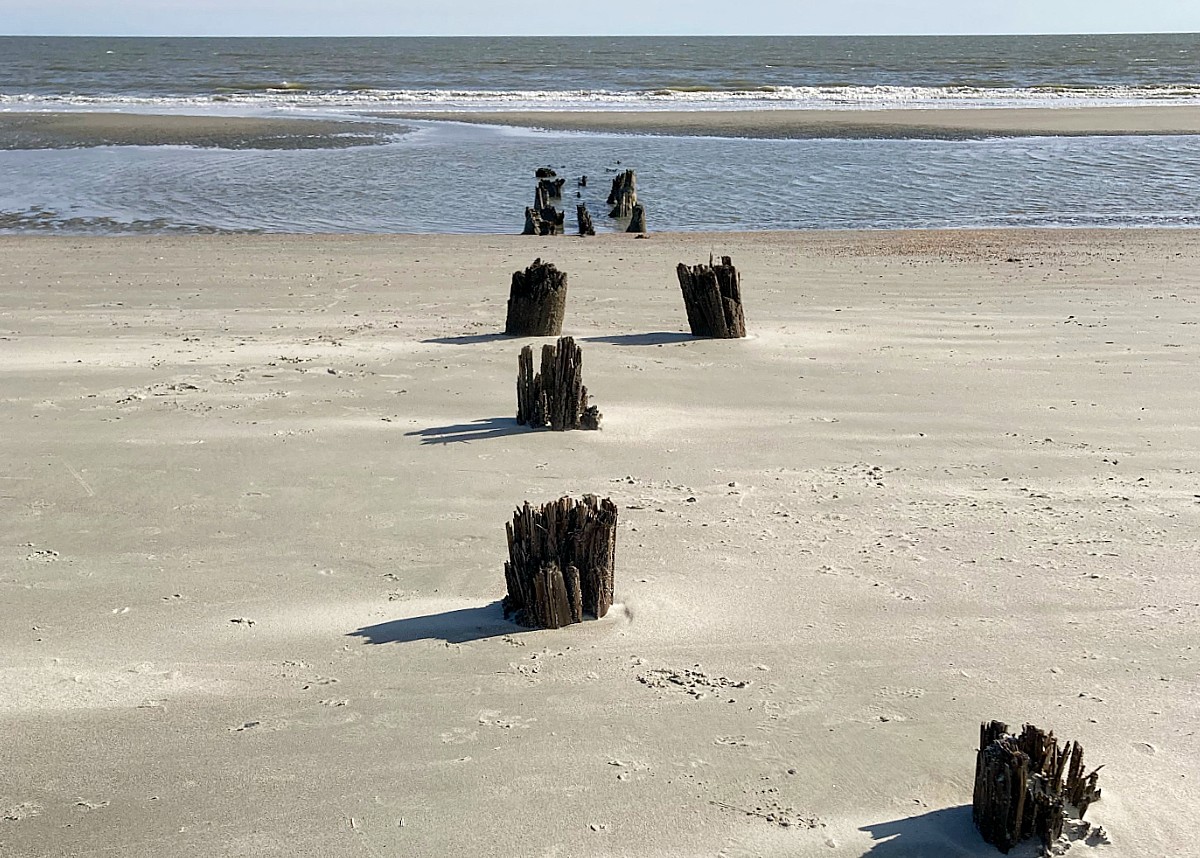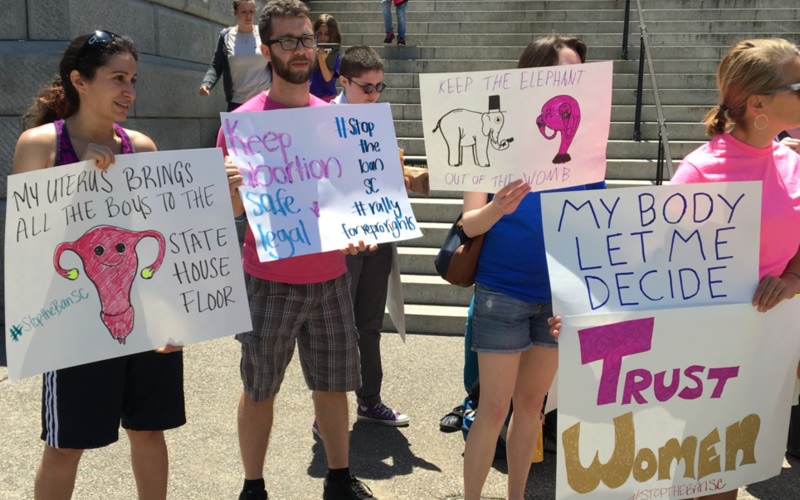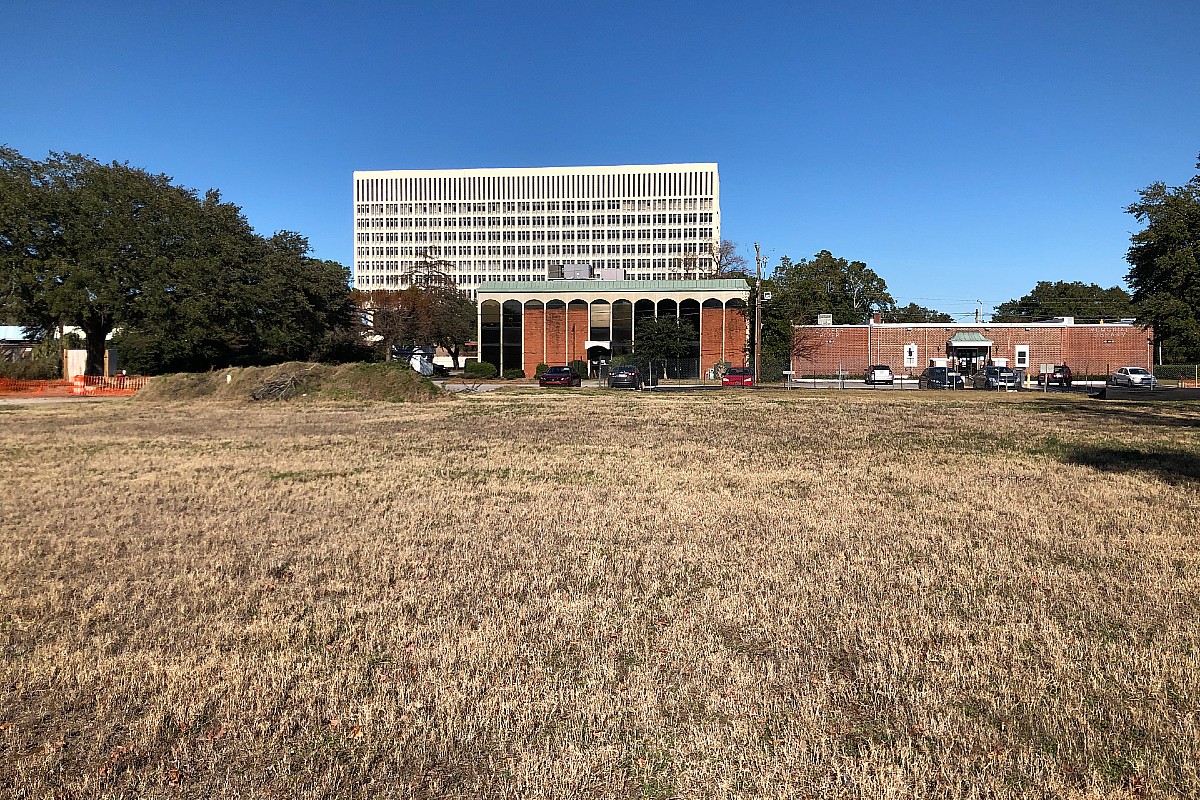Charleston Currents #13.10 | Jan. 18, 2021
BEAUTIFUL DAY. Several Lowcountry residents commented on Facebook over the weekend about how lovely the beach has been recently despite chilly temperatures that kept away crowds. Photo by Kitty Barksdale.
 FOCUS: Kick addiction of racism with King’s prescription
FOCUS: Kick addiction of racism with King’s prescription
COMMENTARY, Brack: Mind-numbing, time-wasting abortion bill on table again
IN THE SPOTLIGHT: SCIWAY
NEWS BRIEFS: State shifts to coronavirus mitigation
FEEDBACK: Send us your thoughts
MYSTERY PHOTO: Empty field
CALENDAR: From MLK brunch to art display
Kick addiction of racism with King’s prescription

King during the 1963 March on Washington. Via Unsplash.
By John L.S. Simpkins, republished with permission | In what would be his final speech as the leader of the Southern Christian Leadership Conference, Martin Luther King Jr., spoke of sin, addiction and redemption. After rattling off a litany of the preceding year’s programmatic achievements, including effective economic boycotts led by a young Jesse Jackson and what would come to be known as Rainbow PUSH, King shifted gears.
“And if you will let me be a preacher just a little bit,” King importuned as he shifted from organization man to man of the cloth. He then told the story of Nicodemus, the Pharisee who asks Jesus how he could be saved through a dialogue about the meaning of being “born again” or, as the Greek translation would read, “born from above.”
“Jesus didn’t get bogged down on the kind of isolated approach of what you shouldn’t do,” King explained. “Jesus didn’t say, ‘Now Nicodemus, you must stop lying.’ He didn’t say, ‘Nicodemus, you must stop drinking liquor if you are doing that excessively.’ He said something altogether different, because Jesus realized something basic: that if a man will lie, he will steal. And if a man will steal, he will kill. So instead of just getting bogged down on one thing, Jesus looked at him and said, ‘Nicodemus you must be born again.’”
King continued, “In other words, ‘Your whole structure must be changed.’ A nation that will keep people in slavery for 244 years will ‘thingify’ them and make them things. And therefore, they will exploit them and poor people generally economically. And a nation that will exploit economically will have to have foreign investments and everything else [to maintain that exploitation], and it will have to use its military might to protect them. All of these problems are tied together.”
King concluded the story of Nicodemus by telling those assembled, “What I’m saying is we must go from this convention and say, ‘America, you must be born again!’” And thus King answered the question that framed those remarks delivered almost 55 years ago: Where do we go from here?
 In a subsequent book bearing the same title as the question raised in his speech, King would propose the two options of “chaos or community.” Either seems a real possibility. In some ways, this is no ordinary time. The well-founded fears of coup d’etat, expressed in a recent opinion piece by the last 10 leaders of the Pentagon, were on display for all the world to see as terrorists stormed the Capitol.
In a subsequent book bearing the same title as the question raised in his speech, King would propose the two options of “chaos or community.” Either seems a real possibility. In some ways, this is no ordinary time. The well-founded fears of coup d’etat, expressed in a recent opinion piece by the last 10 leaders of the Pentagon, were on display for all the world to see as terrorists stormed the Capitol.
In that action, we demonstrated behavior that is all too familiar to some. White rage and privilege were on full and equal display, as frightened, threatened radicals were granted easy access to the heart of America’s legislative branch. A brazen act, certainly, but also yet another bender. Drunk on racism, we’ve fallen off the wagon yet again. The latest intervention has failed to hold.
As King said, our “whole structure must be changed.” Specifically, the latest iteration of race-based radicalization must finally and completely be excised from American political, economic, and social life. But addictions can be hard to shake, and the United States has been hooked for centuries. King’s exhortation for rebirth rang as but one of the multiple attempts at intervention to cure our country’s addiction to race. Douglass, Lincoln, and FDR before him, among others, called attention to our inability to curb our appetite for all the benefits to be derived from a system of “thingification.”
From the slave-labor based business venture that was the Carolinas to denial of WWII-era government contracts to continued redlining and police-involved killings, our national addiction to race and racism is deep and profound. It clouds our collective judgment in the organization of our economy, the formulation of policy, and even what constitutes “disruption” through entrepreneurialism and innovation. But rather than admire the problem, it’s worth focusing on Dr. King’s prescription.
Removing race from the equation will not cure all of America’s ills, to be sure. We will continue to debate the duties owed to each other, and the proper role of government at all levels, and how to allocate scarce resources. We will have removed the intoxicant of race, however, which has clouded our judgment and impaired our vision for 400 years. Chaos has never been our collective aspiration. Sobriety brings clarity, and it is only through a collective rebirth that we will gain the clarity to even embark upon the journey to realizing that beloved goal of community. There are miles to go beyond that yet-to-come awakening. America, you must be born again. Enough. Really.
John L.S. Simpkins was a professor at the Charleston School of Law before he joined the Obama administration. He now is president and CEO of MDC, Inc., a regional think tank that produces an annual State of the South analysis. This article originally was published at Medium.com and is republished with the author’s permission.
- Have a comment? Send to: feedback@charlestoncurrents.com
Mind-numbing, time-wasting abortion bill on table again
By Andy Brack, editor and publisher | Here we go again. South Carolina is wading into a divisive abortion debate before anything else happens in the state Senate to appease the GOP’s conservative base. It’s a futile effort that’s ultimately unconstitutional and a huge waste of time and money.
 But these legislator knuckleheads don’t really care. They want to ram it through now that the state Senate has 30 Republican votes to 16 seats held by Democrats.
But these legislator knuckleheads don’t really care. They want to ram it through now that the state Senate has 30 Republican votes to 16 seats held by Democrats.
Gov. Henry McMaster egged them on in his State of the State address: “Let this be the year that we further protect the sanctity of life – with the heartbeat bill. It’s time to vote. Send me the heartbeat bill and I will immediately sign it into law.”
Hogwash. If Republicans were concerned about the “sanctity of life,” they would get to work to reduce poverty. They would raise the minimum wage. They would make schools far better and stop being wussies on access to affordable health care. In other words, they’d start caring more about the living.
What’s even more frustrating is that the tone-deaf state GOP obviously didn’t learn anything since the Jan. 6 attack on the U.S. Capitol. Republican leaders haven’t grasped that continuing to play the politics of division is not helping the country to heal. Rather than giving top priority to, say, making sure more people get vaccinated more quickly to wipe away the pandemic, the state Senate’s top legislative priority is this so-called fetal heartbeat bill that will make abortions illegal just six weeks after conception. That’s before most women realize they’re pregnant.
“Protecting life in the womb has become the politically expedient mantra of South Carolina Republicans,” state Sen. Mia McLeod, D-Richland, said in the Democratic response to McMaster’s address. “In fact, you and other Republican leaders have made a divisive, unconstitutional bill your number one priority again this session, instead of focusing on protecting the 5 million living, breathing human beings who are already here.”
It’s legislating in the absurd. Why? Because fetal heartbeat bills from other states already have been found unconstitutional in lower courts and appeals are already headed to a more conservative U.S. Supreme Court. What South Carolina does makes no difference at the federal level. So it is doing the legislative equivalent of “piling on.” In other words, it’s just politics as usual.
“The state Senate is spending precious time rushing through extreme legislation that would make almost all abortions illegal in South Carolina,” said South Carolina’s Vicki Ringer of Planned Parenthood. “It is absolutely disgraceful and irresponsible.”
And what happens if the Senate, which already has rushed the bill through a subcommittee, eventually approves the anti-abortion measure? Lawsuits.
“The state will be forced to pay their own legal costs for private attorneys and will have to pay the legal costs for those who bring the lawsuit,” Ringer said. “The typical cost for one of these cases is $1 million, but costs may run up to $10 million or more, as experienced by the state of Texas in the Whole Woman’s Health v. Hellerstedt case in 2016.”
Another negative impact of the S.C. proposal — it would hurt women in the state, particularly those who live in communities of color, are immigrants or who have been discriminated against.
Ringer said the bill “would prevent women from getting abortions as early as six weeks into a pregnancy — only about two weeks after a missed period. … It is an extreme piece of legislation and would make almost all abortions illegal in South Carolina.”
Furthermore, the bill — which has no exclusions for rape, incest or medical necessity — would dramatically interfere with how doctors in the state treat their pregnant patients and threaten their lives.
“A patient experiencing a miscarriage or ectopic pregnancy may need emergency treatment to prevent serious damage to her health or to save her life,” Ringer said. “This legislation would effectively tie doctors’ hands rather than allowing them to treat their patient without fear of prosecution.”
Let’s hope state lawmakers see the folly of what they’re doing and a bipartisan coalition of moderate Republicans and Democrats dispose of this bill as the legislative trash that it is.
Andy Brack is editor and publisher of Charleston Currents, and publisher of the Charleston City Paper. Have a comment? Send to: editor@charlestoncurrents.com.
SCIWAY
The public spiritedness of our underwriters allows us to bring Charleston Currents to you at no cost. Today we shine our spotlight on SCIWAY. Pronounced “sky-way,” SCIWAY is South Carolina’s Information Superhighway — the largest and most comprehensive directory of South Carolina information on the Internet. It includes thousands of links to other South Carolina Web sites, including Charleston Currents, as well as an amazing collection of maps, charts, articles, photos and other resources.
- To learn more about this extraordinary information hub that 7 million people visit a year, go to: http://www.SCIWAY.com.
- To meet all of our underwriters, click here.
State shifts to coronavirus mitigation
Staff reports | The state is shifting its efforts from containment of COVID-19 to community mitigation to slow the spread of the disease as case numbers set new records in recent weeks the state announced Thursday. It’s not clear why mitigation efforts weren’t an earlier priority.
The Department of Health and Environmental Control on Sunday reported 4,584 new cases of the coronavirus Sunday and 76 COVID-19-related deaths.
In the shift to mitigation, South Carolina residents are being called on to continue taking actions health experts know work, like wearing masks, washing hands and social distancing.
“Until the COVID-19 vaccines become more readily available and enough people are vaccinated, we must all act now or continue to face unprecedented numbers of cases that are overwhelming our hospitals and healthcare systems, as well as taking the lives of those we love,” said DHEC Interim Public Health Director Brannon Traxler. “To do that, every one of us must recommit to the fight. We are all on the frontlines. If we don’t act now, we could face many dark months ahead.”
The move from disease containment, in which the effort is made to control the spread of disease, to a disease mitigation phase occurs when cases of disease are widespread and difficult to investigate one by one.
Also last week, the state expanded the range of people who are qualified to administer COVID-19 vaccines in an effort to quicken the speed of distribution.
The state is currently still in Phase 1a of vaccine distribution, limiting vaccines strictly to medical workers, long-term care patients and people aged 70+, but DHEC and the Department of Labor, Licensing and Regulation have expanded the list of medical professionals permitted to administer vaccines. A proactive move, the decision is intended to prepare the state for widespread vaccination distribution when more doses become available.
In other recent news:
![]() Slam dunk for food bank. NBA Hall of Famer Michael Jordan’s November 2020 donation of $2 million to Feeding America will benefit the Lowcountry Food Bank. It will get an undisclosed portion of the donation to support highest-need communities, with a focus on addressing racial disparities in hunger in food insecurity. Jordan’s gift was made in support of food banks in the Carolinas and Chicago. From March 2020 toNovember 2020, the food bank distributed more than 12 million pounds of COVID-19 disaster relief food.
Slam dunk for food bank. NBA Hall of Famer Michael Jordan’s November 2020 donation of $2 million to Feeding America will benefit the Lowcountry Food Bank. It will get an undisclosed portion of the donation to support highest-need communities, with a focus on addressing racial disparities in hunger in food insecurity. Jordan’s gift was made in support of food banks in the Carolinas and Chicago. From March 2020 toNovember 2020, the food bank distributed more than 12 million pounds of COVID-19 disaster relief food.
Sony gives $1.7 million to museum. Sony Corporation of America (SCA), on behalf of Sony Corporation and its U.S. affiliates, last week donated $1.7 million to the International African American Museum, which is scheduled to open in 2022 at the former Gadsden’s Wharf . “Thanks to Sony, the International African American Museum will be a showcase for a new generation of visitor experiences,” said IAAM Chief Operating Officer Elijah Heyward III.
Ports has strong December. The S.C. Ports Authority had its strongest December on record as it handled 209,606 twenty-foot equivalent container units (TEUs) at Wando Welch and North Charleston container terminals, the agency said. That’s up 11.6 percent year-over-year. SC Ports has handled more than 1.2 million TEUs thus far in fiscal year 2021, which began July 1. “The pandemic created unprecedented challenges to supply chains around the world,” SC Ports President and CEO Jim Newsome said. “I am immensely proud of our port employees and all those working in the maritime and logistics community for showing up every day during a pandemic to keep supply chains fluid. Their dedication ensures that food products, medical supplies, manufacturing parts and retail goods are efficiently delivered.”
Lawmakers still stuck on Santee Cooper. It’s been four years since the public learned that state agency Santee Cooper, SCE&G and parent company SCANA bungled a $9 billion nuclear reactor project and left the state with a $4 billion problem. Efforts by lawmakers to hold Santee Cooper accountable so far have failed, as writer Stephanie Barna explains in this story in Statehouse Report. After spending $14 million to develop alternatives for Santee Cooper, dissatisfied lawmakers scrapped the effort and are working on their own solutions.
Biden taps Harrison to lead national Democratic Party. President-elect Joe Biden picked South Carolina’s Jaime Harrison to lead the Democratic National Committee just two months after he lost a high-profile U.S. Senate election that catapulted him onto the national scene. More: The New York Times.
S.C. Legislature to take days off amid pandemic, security fears. The S.C. House and S.C. Senate will take off next week, including Wednesday’s inauguration day after the FBI warned state governments of planned protests. The Senate will next meet Jan. 21, with the House’s next full session set for five days later. More: AP News
S.C.’s Haley sets sights on 2024 presidential. Former S.C. Gov. and Trump administration official Nikki Haley, now a Kiawah Island resident, has started a political action committee in an attempt to help Republicans retake the House and Senate in 2022, and bolster her brand ahead of an anticipated 2024 run for president. More: The Post and Courier
- Have a comment? Send to: editor@charlestoncurrents.com
Got something to say? Let us know by mail or email
We’d love to get your impact in one or more ways:
Send us a letter: We love hearing from readers. Comments are limited to 250 words or less. Please include your name and contact information. Send your letters to: editor@charlestoncurrents.com. | Read our feedback policy.
Tell us what you love about the Lowcountry. Send a short comment – 100 words to 150 words – that describes something you really enjoy about the Lowcountry. It can be big or small. It can be a place, a thing or something you see. It might be the bakery where you get a morning croissant or a business or government entity doing a good job. We’ll highlight your entry in a coming issue of Charleston Currents. We look forward to hearing from you.
Empty field
Here is an empty urban field somewhere in Charleston County that isn’t supposed to be empty. Where is it and what is supposed to occupy this space? Send to editor@charlestoncurrents.com. And don’t forget to include your name and the town in which you live.
Our previous Mystery Photo
 Our Jan. 11 photo, “In stereo,” showed stereoscopic photos of the war-damaged sally port of Fort Moultrie in 1865.
Our Jan. 11 photo, “In stereo,” showed stereoscopic photos of the war-damaged sally port of Fort Moultrie in 1865.
Congratulations to those who identified it correctly: Jay Altman of Columbia; Jane Bergen of Alexandria, Va.; George Graf of Palmyra, Va.; Allan Peel of San Antonio, Texas; Marnie Huger of Richmond, Va.; and Joe Mendelsohn of Charleston.
Altman shared that from April of 1863 until February 1865, Confederate forces at Fort Sumter and Fort Moultrie were bombarded by the Union navy. Confederate troops left Fort Moultrie when the army’s forces left Charleston as Gen. W.T. Sherman’s forces neared Charleston, although they diverted to Columbia.
Peel shared information that is on the back of the photo, which is in the Library of Congress: “Additional information published by Quinby & Co. is printed on the back of the photo, as shown here. It reads (including some grammatical errors): “This picture presents a view of the Sally-Port of Fort Moultrie after the war. The Sally-Port is situated on the land side of the Fort, and was well protected from within. It was approached from the parade ground of the Fort, and was constructed of solid brick work of several feet in thickness. The walls above show the effects of the fire from Fort Sumter and Morris’ Island, as well as the Iron Clads and other vessels of the fleet off the bar. This old Fort, of revolutionary origin and renown, acted a very conspicuous part in the late war. It is worthy of a visit from strangers visiting Charleston.”
Graf noted that a sally port is a secure, controlled entryway to an enclosure, e.g., a fortification or prison. The entrance is usually protected by some means, such as a fixed wall on the outside, parallel to the door, which must be circumvented to enter and prevents direct enemy fire from a distance.
He added that stereoscopic photography was very popular in 19th and 20th centuries for their ability to recreate the illusion of three-dimensional view for viewers using a stereoscope viewer.
- Send us a mystery: If you have a photo that you believe will stump readers, send it along (but make sure to tell us what it is because it may stump us too!) Send it along to editor@charlestoncurrents.com.
![]() MLK Annual Business and Professional Summit: 7:30 a.m. Jan 19. While the annual breakfast event will be held for a socially-distanced few at the Charleston Area Convention and Visitors Bureau’s Camden Room at 375 Meeting Street in Charleston, you can participate virtually with hundreds virtually. Registration information will be available in early January at ywcagc.org. Philanthropist and businesswoman Anita Zucker will keynote.
MLK Annual Business and Professional Summit: 7:30 a.m. Jan 19. While the annual breakfast event will be held for a socially-distanced few at the Charleston Area Convention and Visitors Bureau’s Camden Room at 375 Meeting Street in Charleston, you can participate virtually with hundreds virtually. Registration information will be available in early January at ywcagc.org. Philanthropist and businesswoman Anita Zucker will keynote.
Sunday Brunch Farmers Market: 11 a.m. to 3 p.m., every Sunday, Charleston Pour House, 1977 Maybank Highway, James Island. While the market is discouraging people from spending too much time hanging out during the market, everyone is invited to shop their local vendors.
Wallace abstracts on display. Through Jan. 31, Park Circle Gallery, 4820 Jenkins Ave., North Charleston. Works by local abstract artist Scott Wallace will be on display through the end of the month at a free show. The exhibit, called “Abstraction in Action,” features works in acrylic that explore unusual color palettes and the textural possibilities of acrylic paint. More: ScottWallacePaintings.com.
Craft entries sought. Fine craft artists from around the state are invited to enter the 19th annual S.C. Palmetto Hands Juried Fine Craft Competition and Exhibition, which will be presented April 28 to May 2 as part of the North Charleston Arts Fest. Entry fee is $15. The deadline for entries is March 15. Applications are offered online only. The show, cancelled in 2020 due to COVID-19, will offer objects made in media of clay, fiber, glass, metal, wood, and three-dimensional mixed media. More info: culturalarts@northcharleston.org.
- If you have any online events, drop us a line (editor@charlestoncurrents.com) and make sure to put “Online event” in the subject line. Similarly, if you’ve got cool ideas for stuff to do while in isolation at home, send them our way.
- ORDER NOW: Copies of our new book, 350 Facts About Charleston, are in Lowcountry-area bookstores now, but if you can’t swing by, you can order a copy online today.
As more people stay home to deal with the coronavirus crisis, people are looking for things to do. You can find some fun things to do online in our calendar section below, but let us also encourage you to FORWARD your issue of Charleston Currents to your friends and encourage them to subscribe. It’s got a great price, as you know: Free! We hope they’ll enjoy our coverage.
- DONATE. Now also would be a great time to contribute as we deal with the crisis. In advance, thank you.
OUR UNDERWRITERS
Charleston Currents is an underwriter-supported weekly online journal of good news about the Charleston area and Lowcountry of South Carolina.
- Meet our underwriters
- To learn more about how your organization or business can benefit, click here to contact us. Or give us a holler on the phone at: 843.670.3996.
OUR TEAM
Charleston Currents offers insightful community comment and good news on events each week. It cuts through the information clutter to offer the best of what’s happening locally.
- Mailing address: 1316 Rutledge Avenue | Charleston, SC 29403
- Phone: 843.670.3996
Charleston Currents is provided to you weekly by:
- Editor and publisher: Andy Brack, 843.670.3996
- Contributing editor, common good, Fred Palm
- Contributing editor, money: Kyra Morris
- Contributing editor, Palmetto Poem: Marjory Wentworth
- Contributing photographer: Rob Byko
- Charleston Currents also uses content from the outstanding staff at the Charleston City Paper, a sister publication.
SUBSCRIBE FOR FREE
Subscriptions to Charleston Currents are free.
- Click here to subscribe.
- Unsubscribe. We don’t want to lose you as a reader of Charleston Currents, but if you must unsubscribe, you will have to do it through the email edition you receive. Just go to the bottom of any of your weekly newsletters and click the “unsubscribe” function. If that doesn’t work, please send us an email with the word “unsubscribe” in the subject line.
- © 2008-2021, City Paper Publishing, LLC. All rights reserved. Charleston Currents is published every Monday by City Paper Publishing LLC, 1316 Rutledge Ave., Charleston, SC 29403.








 We Can Do Better, South Carolina!
We Can Do Better, South Carolina!
























